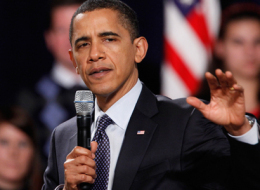Obama To Push Tax On Being 'Too Big To Fail'
January 13, 2010
President Obama will unveil on Thursday a proposed levy on the nation's biggest financial firms structured not just to repay taxpayers for the bank bailout, but to recoup some of the public subsidy that "too big to fail" banks have enjoyed on account of their implicit government backstop, a senior administration official tells the Huffington Post.
This would be by far the government's most assertive step in starting to claw back some of the enormous profits the TBTF banks have reaped, first as a result of the bailout and then from the implicit guarantee that the government would back up their debt of major banks if they ever faced bankruptcy.
Because these banks effectively have the full backing of the American government, they are able to borrow at much lower rates than banks that have to borrow based on their own credit-worthiness.
The administration official tells HuffPost that the planned tax would be imposed in a way that targets firms' riskiest activities, such as proprietary trading. It would be crafted in a way that doesn't affect a financial company's retail banking, so that the cost theoretically would not be passed on to retail customers -- but it wasn't clear exactly how that would work.
"We want to put a price on the riskiest part of the bank," the official said, speaking of highly-leveraged Wall Street trading, rather than Main Street lending.
This would be by far the government's most assertive step in starting to claw back some of the enormous profits the TBTF banks have reaped, first as a result of the bailout and then from the implicit guarantee that the government would back up their debt of major banks if they ever faced bankruptcy.
Because these banks effectively have the full backing of the American government, they are able to borrow at much lower rates than banks that have to borrow based on their own credit-worthiness.
The administration official tells HuffPost that the planned tax would be imposed in a way that targets firms' riskiest activities, such as proprietary trading. It would be crafted in a way that doesn't affect a financial company's retail banking, so that the cost theoretically would not be passed on to retail customers -- but it wasn't clear exactly how that would work.
"We want to put a price on the riskiest part of the bank," the official said, speaking of highly-leveraged Wall Street trading, rather than Main Street lending.

